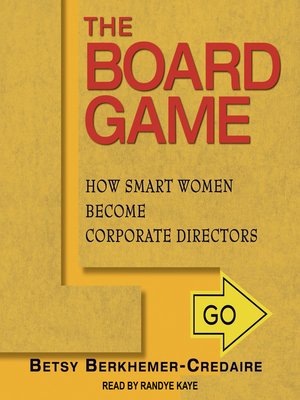The Board Game
audiobook (Unabridged) ∣ How Smart Women Become Corporate Directors
By Betsy Berkhemer-Credaire

Sign up to save your library
With an OverDrive account, you can save your favorite libraries for at-a-glance information about availability. Find out more about OverDrive accounts.
Find this title in Libby, the library reading app by OverDrive.



Search for a digital library with this title
Title found at these libraries:
| Library Name | Distance |
|---|---|
| Loading... |
The Board Game presents the undeniable case for having more women corporate directors at the decision-making tables of America's public companies. Fifty-eight women directors tell how they won their first board seats. From her executive-search perspective, author Betsy Berkhemer-Credaire gives valuable advice to women at all career stages—so YOU, your sisters, your mothers, and your daughters will have a chance to win The Board Game.
Influential male business leaders say it's smart to have women on boards:
"Corporate boards without women directors are basically dysfunctional. Companies can no longer ignore half the population (and seventy percent of the purchasing power) and be successful." —Peter V. Ueberroth, director, Coca-Cola—three women directors today; women on board since 1934.
"A Board of Clones tends to do clone thinking and usually has a very narrow range of creativity. A board that has both genders and multiple ethnicities, is far more likely to be productive and responsive to employees and customers. I feel sorry for any organization that doesn't have a significant level of diversity." —George C. Halvorson, Chairman/CEO, Kaiser Permanente—five women directors on board.
Influential male business leaders say it's smart to have women on boards:
"Corporate boards without women directors are basically dysfunctional. Companies can no longer ignore half the population (and seventy percent of the purchasing power) and be successful." —Peter V. Ueberroth, director, Coca-Cola—three women directors today; women on board since 1934.
"A Board of Clones tends to do clone thinking and usually has a very narrow range of creativity. A board that has both genders and multiple ethnicities, is far more likely to be productive and responsive to employees and customers. I feel sorry for any organization that doesn't have a significant level of diversity." —George C. Halvorson, Chairman/CEO, Kaiser Permanente—five women directors on board.







